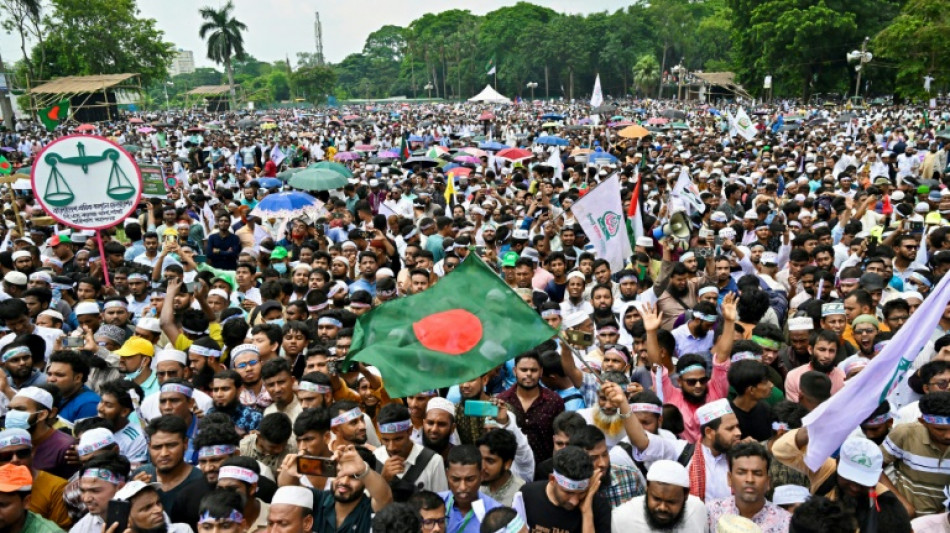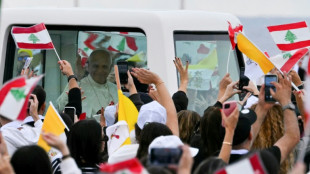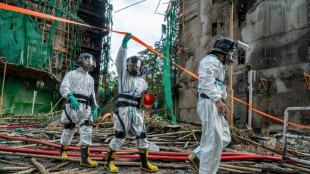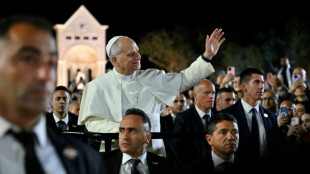
| RBGPF | 1.54% | 79 | $ | |
| CMSC | -0.39% | 23.32 | $ | |
| NGG | -0.61% | 75.65 | $ | |
| AZN | -2.44% | 90.52 | $ | |
| RIO | 0.03% | 71.97 | $ | |
| BTI | -0.91% | 58.13 | $ | |
| GSK | -1.42% | 47.19 | $ | |
| RYCEF | -2.68% | 13.83 | $ | |
| RELX | -1.23% | 39.72 | $ | |
| SCS | 0.55% | 16.38 | $ | |
| VOD | -2.8% | 12.13 | $ | |
| CMSD | -0.13% | 23.29 | $ | |
| BCE | -0.09% | 23.49 | $ | |
| BCC | -1.18% | 75.13 | $ | |
| BP | 1.12% | 36.51 | $ | |
| JRI | -0.15% | 13.78 | $ |

Bangladesh's largest Islamist party holds mega rally
Hundreds of thousands of supporters of Bangladesh's main Islamist party rallied on Saturday, demanding an overhaul of the electoral system as the country gears up for polls next year.
The Jamaat-e-Islami party has gained significant momentum since the ousting of Prime Minister Sheikh Hasina in a popular uprising last year.
During her tenure, Hasina took a hardline stance against Jamaat, even cancelling its registration as a political party.
For decades, Jamaat was barred from holding public rallies.
Last month, the Supreme Court restored the party's registration, paving the way for its participation in elections slated for next April.
"We have suffered a lot in the last 15 years. We went to jail, we were robbed of our political rights," Mohammad Abdul Mannan, a 29-year-old party activist, told AFP.
Demonstrators braving the sweltering heat in the capital demaded changes to the distrution of seats, calling for proportional representation.
"We've gathered here in masses to press our seven-point demand, which includes participatory representation in parliament," Mannan said.
"Elections shouldn't be held unless our demands are fulfilled."
After independence, Jamaat was banned. It later re-emerged and registered its best electoral performance in 1991 when it secured 18 seats.
The party joined a coalition government in 2001, but failed to build lasting popular support.
"We want a proportional representation system so that winners can't take all -- we too deserve a voice," Mannan said.
Tens of thousands of demonstrators began swarming the Suhrawardy Udyan memorial in capital Dhaka by midday, spilling out into the surrounding park.
Some wore T-shirts bearing the party's logo, others sported headbands inscribed with its name, while many displayed metallic badges shaped like a scale — the party's electoral symbol.
Md Shafiqul Islam, 58, travelled from Bogura — a stronghold of the Bangladesh Nationalist Party, which is eyeing a landslide victory in the polls.
"I felt it was my duty as a Muslim to attend. Jamaat-e-Islami promises to establish an Islamic country, and that's why I came," Shafiqul told AFP.
During Bangladesh's 1971 war of independence from Pakistan, Jamaat-e-Islami supported Islamabad, a role that sparks anger among many Bangladeshis today.
Bangladesh's war crimes tribunal sentenced several of Jamaat-e-Islami's senior leaders to death for their roles in the war, executing four of them.
Many Bangladeshis believe the party must acknowledge its past to regain public trust and become a viable electoral force. But at the rally, supporters offered a different take.
"Jamaat is being blamed unfairly," said a 33-year-old private service holder, who spoke to AFP on condition of anonymity.
"It did nothing except uphold the integrity of the nation."
Y.Papantoniou--AN-GR


